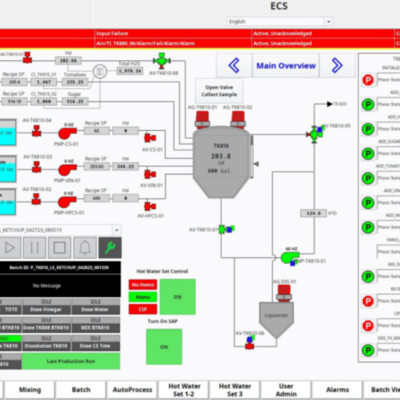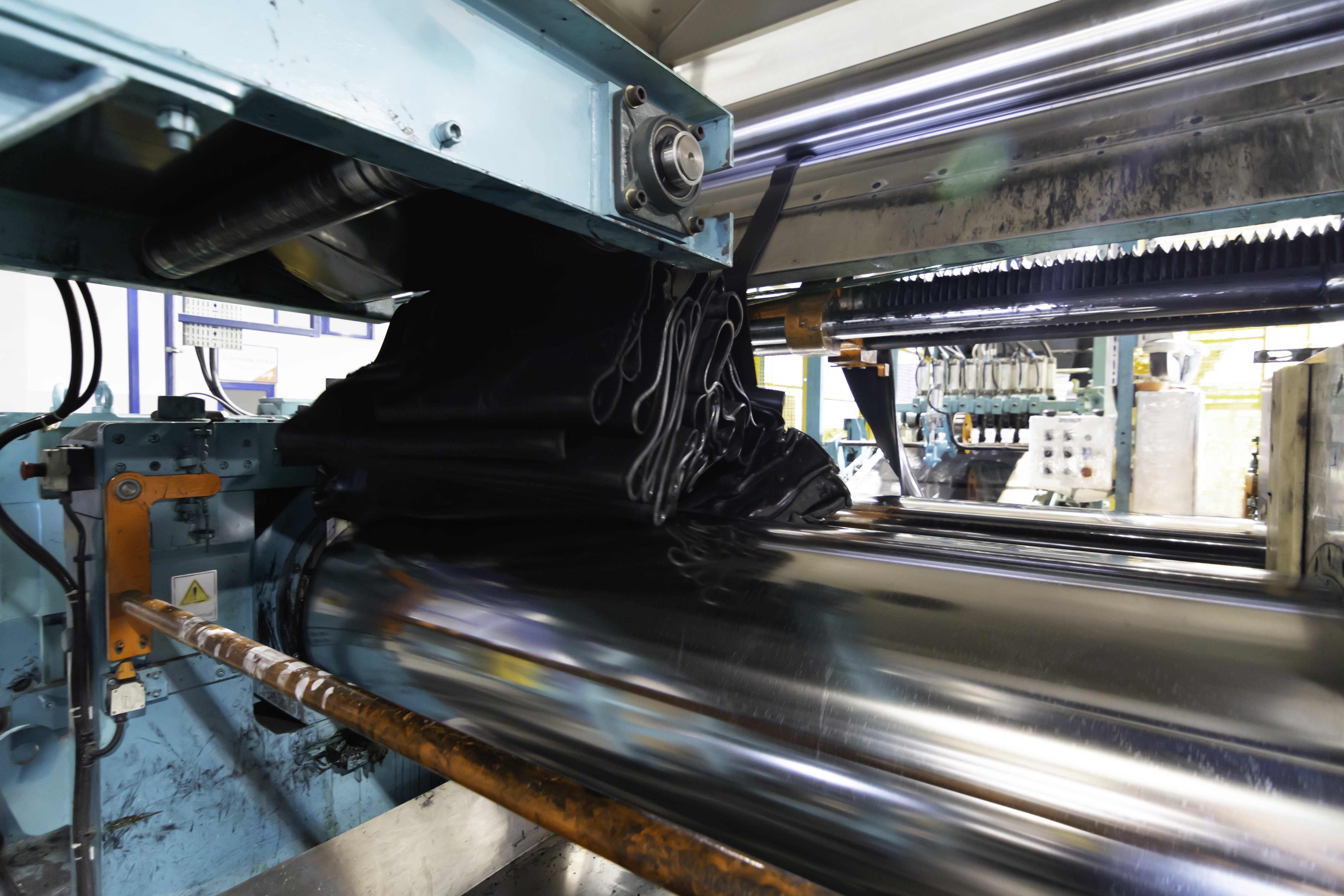News

ECS Delivers True Long Term Success as Trusted Advisors
People and organizations leverage trusted advisors in all facets of life. Whether it is something as commercial as an auto mechanic or as intimate as a primary care physician, attorney, or wealth advisor, trusted advisors play a role just about everywhere. They maintain deep, current knowledge in specialized fields, and they stand ready to support those in need. They are driven by excellence, thinking beyond themselves or their own organization and focus on the broader environment. Where their focus intersects with the needs of a client, a true trusted advisor relationship can take hold.
Control systems integration is young but maturing when compared to many other functions in legacy buildings and operations. The discipline, which barely existed a generation and a half ago, has become the technological focal point of modern manufacturing. There are no lulls or definable steps as technology continually advances at a dizzying pace. What started as ways to simplify wiring and logic applied to flexibility in controls has evolved into a holistic environment which links manufacturing, operations, and supply chains via a web of connected people and equipment. Manufacturers leverage related professionals each day to stay at the edge of technology and to apply it effectively.
ECS Solutions (ECS) has been around since the dawn of the systems integrator-for-hire concept. Our success has been driven by working collaboratively with our clients as true strategic partners. We know that enduring bonds do not develop by accident nor out of contractual obligation. Our clients expect that we know not only where technology is today, but also where it is going. They leverage our extensive knowledge and experience in ways that address both their immediate needs and their continuing objectives.
Read More | Posted In: Bakery Industry, Beverage Industry, Blogs, Chemical Industry, Consumer Goods, Distilleries, Food Industry, Life Science Industry, Metals Industry, News

KNOW YOUR LOOP BEFORE YOU ATTEMPT TO TUNE YOUR LOOP – PART 2
In the last article for this topic, we discussed the importance of field data collection and the importance of a methodical approach to PID tuning. I introduced the concept of the bump test and that its results would help guide the steps and equations used in proper tuning. Here I will explore that concept in greater detail. At ECS we use a visual tool for data collection in every instance. The tool may be part of a controller suite, or it may be stand-alone but, in any case, it is imperative to capture accurate information about the performance of your system before planning and then programming a solution.
In the interest of time, this article will focus on tuning concepts for self-regulating loops as they make up the majority of applications in the industrial field. A common example of this type of loop is a flow control which varies flow through a pipe via either variable speed control on a pump or a position-controlled valve. In this example, the flow can be adjusted by speed adjustment of the pump or position of a valve and the result of the change ordered from the controller is stable and is generally fast and repeatable.
Read More | Posted In: Beverage Industry, Blogs, Chemical Industry, Consumer Goods, Food Industry, Life Science Industry

Innovative Tools for the Evolving Systems Integrator
The personnel challenges facing virtually every industry over the last few years have been nothing short of astonishing. Proper candidates have become increasingly difficult to court and bring on board. New staff in key roles are tasked to accomplish more with fewer floor operators and technology is increasingly leveraged to close the resulting gaps. This is not unique in history although it may seem that way due to the current media deluge surrounding business intelligence and general-purpose visibility software that makes life easier, smarter, and generally more efficient.
Industrial software is again playing a leading role in the current intelligence revolution. Inductive Automation didn’t invent floor supervisory (SCADA) software, nor did they invent the first responsive, general-purpose web software. However, their current offerings certainly do marry these concepts together in a way that hasn’t existed in industry before. Since 2010 their award-winning Vision Module has enhanced the experiences of factory floor users everywhere, easily connecting complex factory controllers to databases, alarm and reporting systems, and intuitive visualization tools. This product is robust, proven, and works very well for users “inside the industrial network” of many facilities. Today this is coupled with the newer Perspective Module which is an equally powerful tool for use in mobile-responsive applications. For situations where a user may be “outside the industrial network” or simply need to utilize a variety of hardware platforms like PCs, phones, or tablets, Perspective provides an ideal solution.
Read More | Posted In: Bakery Industry, Beverage Industry, Blogs, Chemical Industry, Consumer Goods, Food Industry, Inductive Automation, Life Science Industry, Metals Industry, SCADA

ECS & Ignition Deliver for AmeriQual
Success in many industries is the product of preparation and opportunity. Agility is frequently the lubricant that enables businesses to adapt and win a project or contract. This is especially true in private-label food manufacturing. “The people, processes, and equipment must be able to adapt to ever-changing market demands,” says Wes Blankenberger, Vice President of Operations & Maintenance for AmeriQual Group, LLC, in Evansville, IN (AmeriQual). Brand owners must beat their competition to market and the best way to do that is frequently via a capable private labeling partner. Much like brand owners leverage private label manufacturers, the manufacturing plants themselves leverage partners to assemble existing and new equipment into functional processing systems, often on aggressive timelines.
Similar traits and situations define success inside of the control system integration space. Much like private label manufacturing, clients call upon these firms because of their known ability to deliver in specialized market segments. They’re well-trained and typically gainfully employed by clients where they excel. Rarely are they entirely idle but their mix of professionals at different levels and specialties allows them to apply staff, often on short notice, to applications. Their highly trained teams can tackle projects or parts of projects large and small, often in concert with their teammates or outside firms.
Read More | Posted In: Case Studies, Chemical Industry, Uncategorized

High Performance Rubber Batching by ECS
ECS Solutions, Inc (ECS) recently used its extensive batch experience and dynamic company structure to help a major Southeast US rubber manufacturer realize and achieve project success. The end client had an existing semi-automated batch and mixing operation and had recently commissioned a project to duplicate this line’s operation with a new mix room, ingredient systems, and rubber mixer. They employed a powerhouse electrical contractor to connect all the new equipment and make it operate as a single system and this was largely successful. However, as the project moved through its lifecycle, the team realized that sophisticated batch operations would require specialized talents that were missing from the initial project team.
A quick web search for batch expertise within the region quickly pointed to ECS. It’s rare that ECS assets are idle, waiting for project work to arrive, and that was true in this case. Fortunately, the electrical contractor was a proven operator who had the situation in check with respect to major control equipment, general electrical planning, and installation, so ECS was able to apply only batch-specific resources and a slim project management umbrella. The ECS team quickly mobilized and took control of the batch portion of the project.
Read More | Posted In: Case Studies, Chemical Industry

PlantPAx Objects for Chemical Processor
ECS Solutions, Inc. (ECS) recently executed an increasingly rare upgrade for a midwestern chemical processor. The application was rare in that the facility and its controls were neither a brand new, greenfield design nor an upgrade from existing, controller-based automation. This grain processor utilizes volatile hexane in their oil extraction operations so the facility has classified locations throughout. Thus, the legacy control system leveraged pneumatic integration, and hard-wired, and hard-plumbed control loops. That system served them admirably for years and was left in place until this was replaced with a modern electrical system at the direction of ECS.
To facilitate a clean project that could be adopted easily by seasoned operators, ECS built the automation using Rockwell Automation ControlLogix hardware and PlantPAx objects for the code. The robust library of process objects made the code generation very straightforward, and the controller code coupled seamlessly to the Rockwell FactoryTalk View SE SCADA. ECS’ high-performance HMI design focused on a simple, flatter overall concept that leveraged color and animation effectively to drive efficient user interaction. Information from code easily passes to the newly deployed FT Historian system, sharing the same information to the long-term storage.
Read More | Posted In: Case Studies, Chemical Industry

Ignition Perspective® Module
Human-machine interface (HMI) vendors have been promising a utopia based around web-based technologies for over two decades. The prospect of simply providing a web address to anyone within an organization that leads to a fast-loading, full-power supervisory control and data acquisition (SCADA) system has been on most factories’ wish list for a long time. After all, internet page tools and functionality have far outpaced advancements in SCADA software over the same time. The advancements seem to leap forward every time someone reloads a page, with new widgets and tools available almost daily. When coupled with hardware developments like high contrast screens; enhanced touchscreen operations; and capabilities like Bluetooth, accelerometers, geolocation, and more; a flexible, web-based option has been coveted.
What many casual users fail to understand about HMI solutions is exactly how tightly the software is connected to the factory floor controllers. This connection via high-security networks, VPNs, and masks, can be tricky to navigate, particularly when the architecture is intentionally complex to provide security for the systems. Further, most people don’t realize the architectural complexity of software that link to sometimes multiple databases and remote data sources, where gigabits of proprietary information streams into and out of the SCADA application. It has been the responsibility of the integrators of these solutions to protect would-be users from themselves in a lot of applications. Poorly developed programs could create vulnerabilities to the operation of equipment, expose floor workers to potential risk, and possibly allow trade secrets to escape into cyberspace.
Read More | Posted In: Bakery Industry, Beverage Industry, Blogs, Chemical Industry, Distilleries, Food Industry, Inductive Automation, Metals Industry, SCADA

Chemical Manufacturer Upgrades Critical Systems
A midwestern US chemical plant plays an integral part of the worldwide supply of stock for animal feed, refined human vegetable oils, and various other products. This family-owned operation has been a powerhouse in soybean processing, specifically, for more than half a century. As such, their processing areas for that product specifically are considered the epitome of “critical” and run year-round with only a single annual shutdown to handle most large-scale maintenance and upgrade projects.
As this plant looked to install the first ever automation to their critical extraction and shared cooler areas, they knew that this would be a large-scale project that would encompass a multitude of equipment and trades and that the installation would span several years. This project would require partners who could handle the technical scope as well as the extended and complex project management.
Read More | Posted In: Case Studies, Chemical Industry

DVR Module for Troubleshooting and Continuous Improvement
Effective mass production manufacturing operations involve both monitoring of production processes and continual improvement. ECS Solutions, Inc (ECS) has developed an innovative, powerful tool to help their clients develop peace of mind that their products are being manufactured accurately and efficiently while providing a platform to easily improve future interactions. The Process DVR tool satisfies the modern expectation that anything that can be observed visually should be recorded and easily viewed later. When used effectively, the result is truly optimized production control where the best-trained operators deliver accurate results with the least possible waste.
Data Historian capabilities have been built into many vendors’ SCADA systems for a long time. Astute process engineers can call up trending information that illustrates the states and conditions within an automated system, the multitude of lines crisscrossing an HMI terminal in a way their trained eyes can discern. This is an excellent tool by itself, provided that an operation has personnel who are trained to read and interpret the cryptic information that is returned from a standalone Historian. ECS believed that this was conceptually sound but that a more manageable solution would help to bring wider benefits to their processing clients.
Read More | Posted In: Bakery Industry, Beverage Industry, Chemical Industry, Clean in Place, Digitalization, Distilleries, Food Industry, Inductive Automation, Life Science Industry, SCADA

How to Identify, Quantify, and Mitigate Risk in Industrial Operations
A key responsibility of executives and managers in manufacturing is that of risk management. This refers to the obvious risk of physical operations and staff protection, but it also includes quite a bit more: risk to contracts, availability of brands of the direct employer and those of other clients, reputation(s), regulatory, and risk to public safety and health are all increasing concerns with the operating level of a senior executive or manager.
Risk identification is a critical first step; without which, corrective actions cannot be undertaken or could possibly be misguided. Because risks evolve constantly, it is rare that they can be spelled out in a succinct and comprehensive volume. One obvious solution is to install the correct staff in the tiers immediately below the executives but that often raises questions about the specific qualifications of these employees, their tenure and familiarity with every facet of their role within that organization, and whether an overarching net has been cast to identify and compartmentalize relative risks. Further concerns arise around whether an internal team is free of groupthink and whether they possess the proper experience, qualifications, and motivations. (more…)
Read More | Posted In: Bakery Industry, Beverage Industry, Chemical Industry, Food Industry, Life Science Industry, Metals Industry

